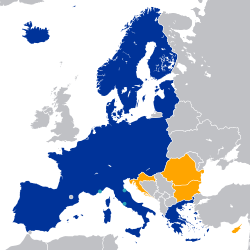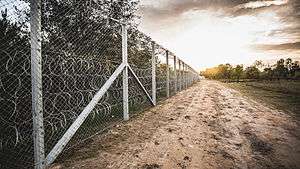European Border and Coast Guard
|
| |
| Agency overview | |
|---|---|
| Formed | 6 October 2016 |
| Jurisdiction | European Union |
| Headquarters | Warsaw, Poland |
| Employees | 1000 (2020, proposed) |
| Annual budget | € 239 million (2016, proposed) |
| Agency executive |
|
| Key document | |
| Website |
frontex |
| Map | |
 | |
The European Border and Coast Guard (EBCG or Frontex[1]) is a border control and management system for the European Schengen Area that is intended to comprise the collective border and coast guards of Schengen Area members with a new, reformed Frontex agency (to be renamed the European Border and Coast Guard Agency) acting as the coordinating body for the Schengen Area as a whole. These proposals were put forward by the European Commission in response to the ongoing European migrant crisis.
The new European Border and Coast Guard Agency would reflect its new strengthened mandate and enhanced tasks and responsibilities. It would aim to introduce common standards of management along the external borders and constantly monitor these borders, with periodic risk analyses and mandatory vulnerability assessments to identify and address weak spots. Liaison officers would be seconded to Member States where the external borders are at risk. They will be able to access the relevant national information systems and to relay the information back to the Agency. To enable the Agency to carry out its tasks, its budget would be gradually increased from the €143 million originally planned for 2015 up to €238 million in 2016, €281 million in 2017, and will reach €322 million (about US$350 million) in 2020. The staff of the agency would gradually increase from 402 members in 2016 to 1,000 by 2020.[2]
On 18 December 2015, the European Council roundly supported the proposal, which will be subject to the ordinary legislative procedure.[3] The Border and Coast Guard was officially launched on 6 October 2016 at the Bulgarian external border with Turkey.[4]
Background


The Commission was prompted to take swift action due to the immigration crisis of 2015, which brought to the forefront the need to improve the security of the external borders of the union. This crisis has also demonstrated that Frontex, which currently has a limited mandate in supporting the Member States to secure their external borders, has insufficient staff and equipment and lacks the authority to conduct border management operations and search-and-rescue efforts.
The Agency was proposed by the European Commission on 15 December 2015[5] to strengthen Frontex, widely seen as being ineffective in the wake of the European migrant crisis. Support for the proposal has come from France and Germany, with Poland and Hungary expressing opposition to the plan, concerned by the perceived loss of sovereignty.[6]
The limitations of the current EU border agency, Frontex, have hindered its ability to effectively address and remedy the situation created by the refugee crisis: it relies on the voluntary contributions by Member States as regards resources, it does not have its own operational staff, it is unable to carry out its own return or border management operations without the prior request of a Member State and it does not have an explicit mandate to conduct search and rescue operations. The enhanced Agency will be strengthened and reinforced to address all these issues. The legal grounds for the proposal are article 77, paragraph 2(b) and (d), and article 79, paragraph 2 (c), of the Treaty on the Functioning of the European Union. Article 77 grants competence to the EU to adopt legislation on a "gradual introduction of an integrated management system for external borders," and article 79 authorizes the EU to enact legislation concerning the repatriation of third-country nationals residing illegally within the EU.
Organisation
According to the European Commission the European Border and Coast Guard "will bring together a European Border and Coast Guard Agency built from Frontex and the Member States’ authorities responsible for border management"[7] with day-to-day management of external border regions remaining the responsibility of member states. It is intended that the new European Border and Coast Guard Agency will act in a supporting role for members in need of assistance, as well as to coordinate overall border management of Europe's external borders. Securing and patrolling of the external borders of the European Union (EU, in practice the Schengen Area including the Schengen Associated Countries as well as those EU Member States which have not yet joined the Schengen Area but are bound to do so) would be a shared responsibility of the Agency and the national authorities.
Agency

The European Border and Coast Guard Agency would not be a new body. It does not replace Frontex and it retains the same legal personality. What the Commission draft Regulation aims to do is to strengthen the mandate of the EU border agency, to increase its competences and to better equip it to carry out its operational activities. The new tasks and responsibilities of the Agency need to be reflected by its new name.
It would coordinate its work alongside the European Fisheries Control Agency and European Maritime Safety Agency with regard to coastguard functions.
The permanent staff of the Agency would be more than doubled. The new proposal provides for a reserve of European border guards and technical equipment. The Agency would be able to purchase its own equipment (this is not a novelty). However - and this is new - the Member States where this equipment is registered (this refers mainly to big equipment items such as patrol vessels, air crafts, etc. which need a flag of state) will be obliged to put it at the Agency's disposal whenever needed. this will make it possible for the Agency to rapidly deploy the necessary technical in border operations. A rapid reserve pool of border guards and a technical equipment pool will be put at the disposal of the agency, intending to remove the shortages of staff and equipment for the Agency's operations.
Monitoring and risk analysis
A monitoring and risk analysis centre would be established, with the authorisation to carry out risk analysis and to monitor the flows towards and within the EU. The risk analyses would include cross-border crime and terrorism, process personal data of persons suspected to be involved in acts of terrorism and cooperate with other Union agencies and international organisations on the prevention of terrorism. A mandatory vulnerability assessments of the capacities of the Member States to face current or upcoming challenges at their external borders will be established.
The Agency would be able to launch joint operations, including the use of drones when necessary. The European Space Agency's earth observation system Copernicus would provide the new Agency with real time satellite surveillance capabilities alongside the current Eurosur border surveillance system.
Teams
For joint operations and rapid border interventions, European Border and Coast Guard Teams would be established and deployed.
The right to intervene
When deficiencies in the functioning of the border management system of a Member State are identified as an outcome of the mandatory vulnerability assessment, the Agency will be empowered to require that Member States to take timely corrective action. In urgent situations that put the functioning of the Schengen area at risk or when deficiencies have not been remedied, the Agency will be able to step in to ensure that action is taken on the ground even where there is no request for assistance from the Member State concerned or where that Member State considers that there is no need for additional intervention.
The right to intervene. Member States will be able to request joint operations, rapid border interventions, and deployment of the EBCG Teams to support national authorities when a Member State experiences an influx of migrants that endangers the Schengen area. In such a case, especially when a Member State’s action is not sufficient to handle the crisis, the Commission will have the authority to adopt an implementing decision that will determine whether a situation at a particular section of the external borders requires urgent action at the EU level. Based on this decision, the EBCGA will be able to intervene and deploy EBCG Teams to ensure that action is taken on the ground, even when a Member State is unable or unwilling to take the necessary measures.
The right to intervene is a point of contention between a number of EU Members and the Commission, especially those Members whose borders form the external borders of the EU, such as Greece, Hungary, Italy, and Poland. They want to ensure that intervention is possible only with the consent of the Member States, whose external borders necessitate the presence of the ECBGA. Greece’s Alternate Minister for European Affairs, Nikos Xydakis, stated in an interview that while Greece is supportive of a common European action and of changing Frontex’s mandate, it wants the ECBGA to take complete charge of migration and refugee flows.
Working with and in third countries
The Agency would have a new mandate to send liaison officers and launch joint operations with neighbouring third countries, including operating on their territory.
Repatriation of illegal immigrants
As part of the Border and Coast Guard a Return Office would be established with the capacity to repatriate immigrants residing illegally in the union by deploying Return Intervention Teams composed of escorts, monitors, and specialists dealing with related technical aspects. For this repatriation, a uniform European travel document would ensure wider acceptance by third countries. In emergency situations such Intervention Teams will be sent to problem areas to bolster security, either at the request of a member state or at the agency's own initiative. It is this latter proposed capability, to be able to deploy specialists to member states borders without the approval of the national government in question that is proving the most controversial aspect of this European Commission plan.[2]
National authorities

As part of the European Border and Coast Guard, the following national authorities would continue to exercise the day-to-day management of their sections of the external borders of the Schengen Area:
See also
- Schengen Area
- European Asylum Curriculum
- Asylum in the European Union
- European Border Surveillance System ('Eurosur')
- Global Monitoring for Environment and Security ('Copernicus Programme')
Existing agencies
- European Fisheries Control Agency
- European Maritime Safety Agency
- European Border Surveillance System
- European Police Office ('Europol')
- European Asylum Support Office
References
- ↑ See Regulation (EU) 2016/1624 recital 11 ("...the European Agency for the Management of Operational Cooperation at the External Borders of the Member States of the European Union should therefore be expanded. To reflect those changes, it should be renamed the European Border and Coast Guard Agency, which will continue to be commonly referred to as Frontex. It should remain the same legal person, with full continuity in all its activities and procedures....") and article 6 ("The European Border and Coast Guard Agency shall be the new name for the European Agency for the Management of Operational Cooperation at the External Borders of the Members States of the European Union established by Regulation (EC) No 2007/2004. Its activities shall be based on this Regulation....")
- 1 2 "European Agenda on Migration: Securing Europe's External Borders". europa.eu. European Commission. Retrieved 15 December 2015.
- ↑ http://www.ft.com/intl/cms/s/0/0b7ce862-a59b-11e5-9101-8718f09f6ece.html
- ↑ http://ec.europa.eu/news/2016/10/20161006_en.htm
- ↑ "A European Border and Coast Guard to protect Europe's External Borders". European Commission. 2015. Retrieved 2015-12-15.
- ↑ "Migrant crisis: EU to launch new border force plan". BBC. 2015. Retrieved 2015-12-15.
- ↑ "A European Border and Coast Guard to protect Europe's External Borders". europa.eu. European Commission. 15 December 2015. Retrieved 16 April 2016.
External links
- Proposed regulation (on EUR-Lex)
- European Commission press release
- European Commission fact sheet
- United States Library of Congress description
